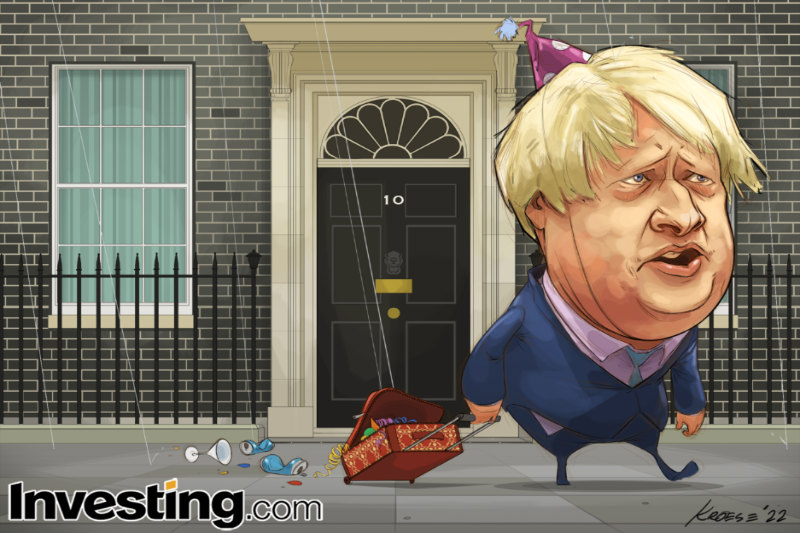By Geoffrey Smith
Investing.com -- Sad trombones, please. Boris Johnson’s rule is over, and not a moment too soon.
He leaves the U.K. poorer, more divided, less stable and more isolated than it was six years ago, when his baleful influence on British politics began in earnest. His constant, compulsive lying – this was the third time in his career that he has lost his job for that offense – has profoundly undermined Britons’ trust in government, and the world’s trust in Britain, in that time. As a result, popular support for his Conservative Party has fallen from nearly 44% at the 2019 general election to as little as 28% currently, over 10 points behind the left-wing Labour opposition, its worst performance since before the Great Financial Crisis.
His reckless and cavalier leadership in the early days of the pandemic led to the U.K. having significantly more deaths – over 180,000 in total – than any other European country: a failing only partly mitigated later by an energetic and enterprising vaccination campaign.
His pet project, Brexit – which he only ever used as a tool with which to lever himself into power – has led thousands of high-skilled, high-wage jobs to migrate to the Continent, while creating nothing of equal value, setting the country on a long-term course toward lower productivity and wealth, according to a new study by the Resolution Foundation.
The U.K. was the second-fastest-growing G-7 economy in 2016, before the Brexit referendum, which he swung decisively in favor of leaving the EU. But growth has slowed since then, with key industries such as financial services and auto manufacturing withering on the vine, investment deterred by the lingering uncertainty over relations with the EU. It hasn’t helped that Johnson decided this year to rip up unilaterally the deal that he made with the EU (despite selling it to the electorate in 2019 as ‘oven-ready’).
In Johnson’s defense, the problems he leaves to his successor are not all of his own making. He didn't create the current energy crisis engulfing all of Europe. He didn't invade Ukraine and, indeed, has risen to the challenges that crisis has presented better than his counterparts in France and Germany. He is not responsible for the demographic problems that are skewing national income and spending wildly in favor of the older generation. (The fair-minded will acknowledge that Johnson has done more than his fair share to redress the generational imbalance, fathering more children on more women than he could ever remember in public.)
But whatever his personal responsibility, Johnson has presided over an accelerated decline in the health of public finances, despite raising taxes to their highest level – as a share of national income – since the 1970s. The U.K.’s structural budget deficit widened to 4.4% of gross domestic product last year, as the army of (largely Conservative-voting) pensioners grew inexorably, while the number of jobs in the economy stayed stubbornly around half a million below where it was before the pandemic.
Such numbers explain why the issue of tax is now at the heart of the succession race. His former Chancellor of the Exchequer, Rishi Sunak, had already penciled in another big tax hike this year to finance the kind of social care scheme that has been common in Europe for 30 years or more, as well as increases in national insurance for the self-employed and a big increase in corporate income tax (albeit with much-expanded allowances for investment). Those plans sit uncomfortably with the heirs to Margaret Thatcher’s low-tax, small-state ideology.
Accordingly, many of those now running against Sunak are trying to win hearts and minds with promises of quick and painless tax cuts. Only Nadhim Zahawi, Sunak’s successor at No. 11 Downing Street, has been honest enough to admit that these would need to be balanced by steep cuts in government spending.
Sunak had claimed, in the resignation letter that triggered the final act of Johnson’s premiership, that the public was ready to hear “hard truths” about the need for consolidation after two years of emergency freebies. As the leadership contest unfolds, the stress-testing of that idea will perhaps be the most interesting aspect of what is otherwise likely to be a depressingly inane spectacle.
“The fiscal room will be quite limited to allow tax cuts,” said David Zahn, head of European fixed-income at Franklin Templeton, in a note to clients. “So even though many may talk about cutting taxes, I think the chances are low.”
One thing is certain: in today’s markets, with inflation at its highest in four decades, few investors are willing to give the benefit of the doubt to anything that smacks of currency debasement. The pound hit a new low for the year against the dollar and is now down 12% so far in 2022, and about 15% down on its pre-referendum level. It will be a long road back.
